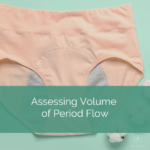
Diagnosis with Menstrual Blood: Future Women’s Health Initiatives
June 28, 2024
Period Flow: Assessing Volume
July 24, 2024Heavy Menstrual Bleeding: Tranexamic Acid
This week, we're going to talk about some possible causes and treatments of heavy bleeding, because this isn't really something we- as women- are taught to articulate and navigate with periods! Which seems silly because almost 1 in 5 women experience this at some point in their lives.
So for a quick recap, menorrhagia is typically identified by:
- period volume loss >80 mL
- needing to change your product every 2-4 hours
- blood clots larger than a quarter
- periods lasting longer than 7 days
Common culprits for heavy bleeding are:
- PCOS
- high estrogen/low progesterone
- endometriosis
- anovulatory "cycles" (which means not all the bleeds are real periods!)
- benign uterine growths like fibroids, polyps, or adenomyosis
- thyroid disfunction (either hypo- or hyper-)
- certain stages of perimenopause
Other issues could be:
- infection
- bleeding disorders
- cancers
- PID
- or even some medications
... and that's not anywhere near exhaustive. Basically: it's a long list, ladies! And therefore the management or treatment of heavy bleeding is going to vary a lot based on the probable cause of the bleeding.
If the issue is hormonally-based, then it's likely that your doctor will offer a hormonally-based solution... which is why most of us simply get offered hormonal birth control and sent away. In some cases, the temporary disruption of your natural hormones can have a positive impact on symptoms, but it's really important to discuss with your doctor all the potential side effects of this management plan AND to ascertain whether this relief will be temporary only while you are taking the hormones, or if the issues will come back as soon as you stop. If you're interested in hormonal therapies (which, btw, Catholics are permitted to take for medical issues by the principle of double effect), you can also inquire about the possibility of using bio-identical hormones and/or hormonal therapy which is targeted to certain times in the cycle, rather than generalized throughout. Or, you can look into natural options to balance hormones over time.
If the issue is related to physical structures in the body (e.g., cysts, endometriosis), it may be the case the surgery could be required. But you'll need imaging and tests to confirm a diagnosis. A couple of weeks ago I featured one of my favorite resources for understanding surgical options for endometriosis, Dr. Naomi Whittaker. So if you have questions about that, check her out.
But the real reason I wanted to talk about menorrhagia is because of the life-changing treatment plan I have just started taking: tranexamic acid.
This is a drug which works by disrupting the coagulation (bleeding-clotting) cascade by preventing clots from breaking down. I started taking this medication a few months ago and my periods went from well over 100 mL down to about 35 mL. That's a HUGE difference!
But as a menstrual cycle educator, I needed to follow up with my doctor because my curiosity was piqued. I said:
"I have kind of a dumb question."
"I bet it's not dumb, but go ahead."
"Menstrual loss is about the endometrium breaking down and shedding. So, if my body is producing endometrial lining so thick that my periods were that heavy before... where is the blood going now? What is happening?"
He laughed, not in a dismissive sort of way, but in an appreciative sort of way.
"It's not getting reabsorbed, if that's what you're thinking. The way I like to explain it is this:
This is why, as a teenager, birth control pills did NOTHING to help my heavy bleeding. Because, as it turns out, I do have a healing disorder and so this makes perfect sense. And it's frustrating that I had to go through hormone treatment, multiple rounds of imaging over many years, and even exploratory surgery for endometriosis in order to find out that my reproductive system is just a part of my body and has all the same issues the rest of my body does. 😂😂😂
So I'm just here to tell you a few things :
1) Heavy bleeding is not normal, and you deserve to have it investigated by your doctor!
2) Treatment or management options are not one-size-fits-all. It's really important to find a doctor who will help you understand why you are having these bleeding issues, and to offer appropriate treatment in response.
3) Tranexamic acid is a fabulous thing that none of my other OB-GYNs ever suggested in the 20 years I've asked about options. Maybe because they didn't know about it? So be sure you ask about it if you have concerns about your own bleeding patterns, and see if your doctor can advise you on its suitability for your situation.




